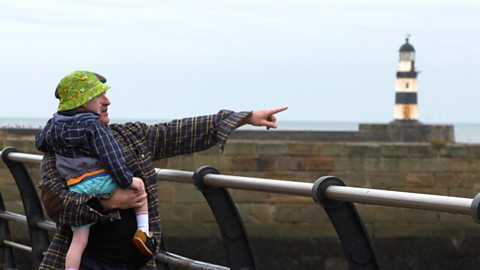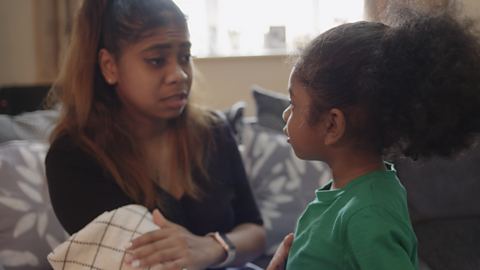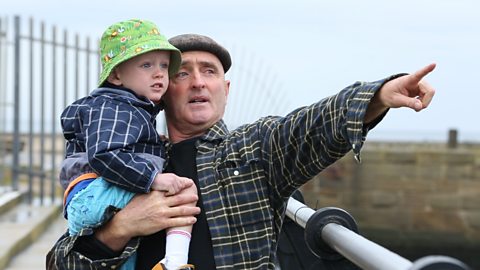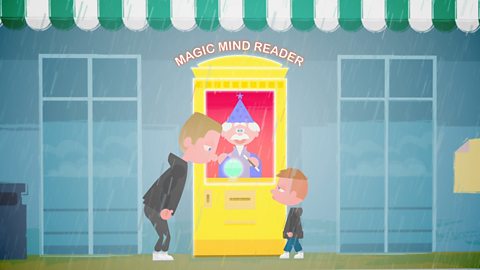As their language skills develop, your child may start to recognise talk about the past and future more easily.
You can help them to understand past and future tenses by practising talking with them about things that have happened and will happen later on.
Perhaps you could discuss the things that happened yesterday and test their memory or you might start making plans for tomorrow, what you're going to do and what you might need to think about beforehand.
Find out more in the video below.
Do you know, your child is starting to recognise and talk about the past and future, fantastic tools for their developing talking skills.
These are more complex subjects to chat about, but they can handle it!
You could make it a daily talking point to ask questions like what happened yesterday or where are we going next week?
This helps them talk about the things that arenât happening right now, otherwise known as decontextualising.
Theyâre getting a grasp of abstract understanding.
So encourage your child to reflect on stories and future chat.
By asking simple âwhat, why, whereâ questions, give them time to respond and keep doing it!
How kids learn about the past and future
When children reach the age of 3-4, their memories have developed to become more advanced and they'll start thinking and talking more about the things that have happened to them in the past as opposed to talking only about things in the here and now.
At the same time, they will begin to think about things that might happen too and start making plans for the future.
You can help them to develop their understanding about past and future and their ability to put these thoughts into words by speaking to them about things that have happened and will happen.
Ways to get children talking about past and future
Key to developing children's language skills to talk about more complex things like past and future events is to ask lots of 'what, why and where' questions about things that have happened, are going to happen or might happen.
You could make discussing the events that have happened during the day and what is going to happen tomorrow a regular daily talking point.

Talking about the past
Memory games are great for chatting with children about things that you've done together. If you make a point of pointing things out as you go on trips - whether it's something at the supermarket, on walks, or on trips to see family or friends - and make a mental (or written down) note of what you could ask them about later on. For example, you could ask 'what did we see down at the harbour?' or 'what fruit did we buy earlier on? Can you remember?'.
Offer lots of praise for whatever they manage to remember and you might find that they can remember more and more details, giving them great practise forming more complex sentences.
Talking about the past is also a great way for children to practise giving their opinion on things. You could ask them what they liked best about their experiences, e.g. 'What did you like best about the beach?' or 'What did you like best? Building a sandcastle or swimming in the sea?'.
Whatever they remember, you could prompt them for more detail. So for example, if they say 'we built a sandcastle', you could ask 'what did you use to decorate your sandcastle?'.
If your child is struggling to remember or recall events, try taking a few pictures of the event on your phone and use these to help them talk about what they did and what they saw afterwards. Picture cues often help children to recall information or help them find the words to describe them to you. If you are able to collect any objects that link to the event, for example, shells from the beach or tickets from a bus trip, these can also help your child remember and recall the events better.
Another great way to get children talking in the past tense is to try getting them to recall details from a story after hearing it. Ask them lots of questions about what happened in the story and why.
Talking about the future
An easy way to try and get your child talking about the future is to ask them about what they'd like to do, whether that's what they'd like to do tomorrow, next week, or even when they grow up.
They might struggle with the grammar of talking about the future, but if they do, just repeat their ideas back to them using the correct words.
Plans for the future can involve a bit of imagination. They don't need to be realistic - you might find that your child says they'd like to go to Australia tomorrow, or even outer space!
To get them thinking really creatively about future plans, you could get them to plan an adventure with their favourite teddy! Ask them about all the things they might, see, hear and smell on their journey.
- Has your child learned to time travel yet? This short video explains everything you need to know.
- Check out these top tips from Dr Clare Halsey on improving your child's memory and encouraging them to think outside of the present moment.
- See talking about the past being put to the test in our Speech Lab







